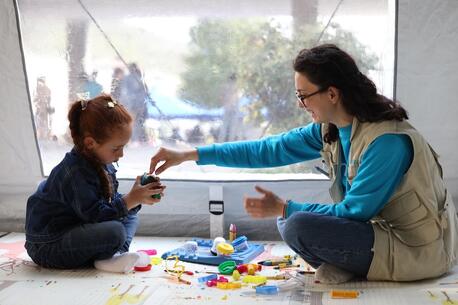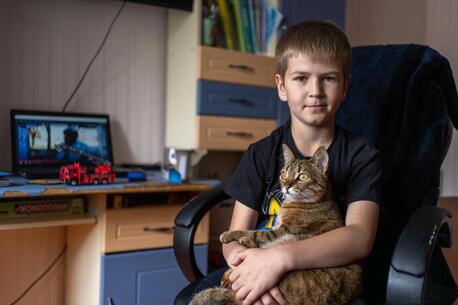
Fostering a Community of Helpers: Organizing Around Mental Health
As COVID-19 has upended our daily lives, a shadow mental health pandemic has been growing, affecting young people most drastically. Because of this, many of our UNICEF UNITERs have been making the destigmatization of mental health a priority in their volunteer work. Whether through local advocacy work, making information and resources accessible to others or hosting school events to raise awareness, UNITERs are not only themselves taking action on mental health but also empowering their community to do so.
A UNITER advocates for mental health education in her community
I look closely at the student's self-advocacy skills and coping strategies and develop plans to improve these skills in the student both in their educational environment and in the world beyond. Long after they forget calculus, these skills remain. — Marcy Kaplan, UNICEF UNITER
For Marcy Kaplan, a UNITER from Boston, mental health has always meant overall health and well-being. “They are one and the same. I view my mental health as a large part of my well-being which I consciously attend to,” she says. This mindset, along with the realization that many still view mental health as a taboo topic, has motivated her to help others through advocacy work. An educational advocate, Kaplan served for seven years on her town’s School Committee. In her role, she advocated for the district’s adoption of a K-12 social-emotional curriculum, as well as for funding for counselors.
Still working closely with families of students with learning challenges, she centers the social and emotional learning of each student. “I look closely at the student's self-advocacy skills and coping strategies and develop plans to improve these skills in the student, both in their educational environment and in the world beyond. Long after they forget calculus, these skills remain.”
High school club members encourage other young people to prioritize their mental well-being
Diya Theodore, from Los Angeles, and Tenzin Kunsang, from Chicago, both UNICEF USA Youth Representatives and High School students, agree on the importance of learning about prioritizing one’s mental health at school. Mastering the skill of self-care is vital to meeting the demands of school and everyday life, not to mention coping with life during a global pandemic. Both agree that the first step in taking care of one’s mental health is accepting one’s own emotions and being okay with not being okay.
In times when she needs to focus on her mental health, Theodore turns to physical activities such as going on hikes and doing yoga. “These calming hobbies allow me to find peace despite the everyday stresses of being a student, especially with finals season right now.” Kunsang, on the other hand, turns to music. “I need to feel the emotions that I'm experiencing at the moment, so I usually listen to music that matches my mood. After I've sufficiently focused on what I'm currently feeling, then I'm able to bounce back into the normal swing of things. I think music is very much catharsis as it is an art,” she notes.
Last year, Kunsang and her UNICEF Club hosted a school-wide project where students could write down what mental health means to them to raise awareness for young people's common experiences with anxiety, depression, and trauma.
Both of them know what to do in times when they’re experiencing stress and anxiety. But they’re also aware that many of their peers don’t have a similar awareness because they haven’t had the same mental health education. To change this, they are working with their UNICEF Clubs and the wider UNITE community. For example, last year, Kunsang and her UNICEF Club hosted a school-wide project where students could write down what mental health means to them to raise awareness for young people’s common experiences with anxiety, depression, and trauma. The anonymous messages were then posted on the window of their school building in downtown Chicago. “This allowed school faculty and students, in addition to pedestrians on the street, to read these thoughtful messages that aimed to make our school a more inclusive space,” she notes. They hope to put on similar events in the future, especially in the coming months, to help young people recover from the past year of lockdown and isolation.
Kaplan also wants to continue taking action on mental health in her community, working together with fellow UNITERs to support mental health awareness, especially in marginalized communities. “There is a strong connection between the marginalization of many communities and mental health challenges. You cannot address one without addressing the other. There is so much work to be done.”
Looking to take action on mental health? Join UNICEF UNITE in your community here. Also, be sure to urge Congress to pass the Mental Health Services for Students Act here.
Top photo courtesy of Mental Health Action Day © MTV
HOW TO HELP
There are many ways to make a difference
War, famine, poverty, natural disasters — threats to the world's children keep coming. But UNICEF won't stop working to keep children healthy and safe.
UNICEF works in over 190 countries and territories — more places than any other children's organization. UNICEF has the world's largest humanitarian warehouse and, when disaster strikes, can get supplies almost anywhere within 72 hours. Constantly innovating, always advocating for a better world for children, UNICEF works to ensure that every child can grow up healthy, educated, protected and respected.
Would you like to help give all children the opportunity to reach their full potential? There are many ways to get involved.





